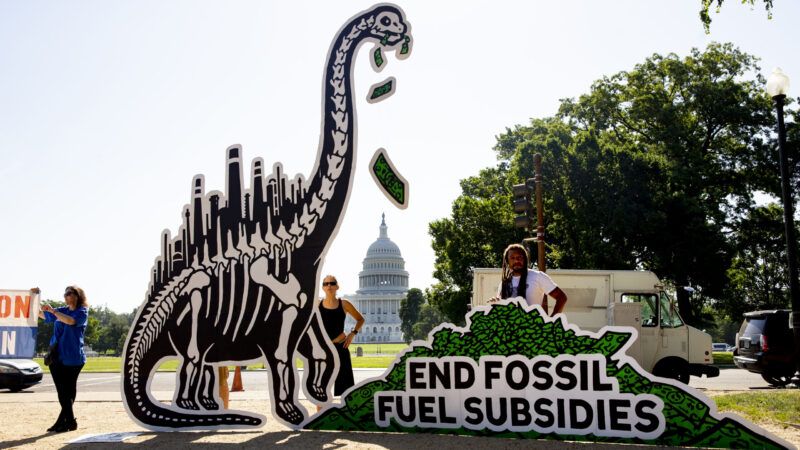U.N. Climate Report Recommends Ending Fossil Fuel Subsidies
One place where environmentalists and libertarians are on the same page

This month the United Nations' Intergovernmental Panel on Climate Change (IPCC) issued its AR6 Synthesis Report, summarizing the latest findings on mitigating the effects of climate change. The full report advocates a number of strategies to that end, with the ultimate goal of cutting global greenhouse gas emissions in half by 2030.
One welcome suggestion is the elimination of fossil fuel subsidies.
There are two primary types of fossil fuel subsidies. Production subsidies offset the costs for companies involved in energy production. Consumption subsidies make the final product less expensive for consumers.
The subsidies have their defenders. In 2011, when President Barack Obama suggested ending oil company subsidies amid rising gas prices, Sen. James Lankford (R–Okla.) countered that the proposal would "hurt the everyday consumer of energy and imperil the jobs of millions of hard-working people in American-based companies."
The IPCC's report recommended that "removing fossil fuel subsidies would reduce emissions, improve public revenue and macroeconomic performance, and yield other environmental and sustainable development benefits such as improved public revenue, macroeconomic and sustainability performance," a claim it made with "high confidence." The panel further posited that "fossil fuel subsidy removal is projected by various studies to reduce global [carbon dioxide] emissions by 1–4%, and [greenhouse gas] emissions by up to 10% by 2030," a statement it made with "medium confidence."
Environmentalists and free marketeers might not agree on some of the IPCC's other recommendations, but here is one subject where both groups are on the same page. Fuel subsidies lower the cost of energy and incentivize consumption: When the price of fuel is artificially lowered, more people will drive and fewer will turn to carpooling and other commuting alternatives. After all, there's a reason that demand for electric cars surges whenever oil prices spike.
"Prices for end-consumers rarely move in lockstep with international prices because of various buffers, contractual provisions or other mechanisms to smooth volatility," according to the International Energy Agency (IEA). Even as Russia's invasion of Ukraine rocked the global energy market, prices paid in many countries remained artificially low.
The reason? More than $1 trillion in global consumption subsidies in 2022, considerably more than any other recent year. The IEA found that subsidies on natural gas and electricity consumption more than doubled, while oil consumption subsidies rose by 85 percent. The International Monetary Fund found that total global fossil fuel subsidies, both production and consumption, totaled $5.9 trillion in 2020, or 6.8 percent of global GDP.
A decade ago, a study published by the National Bureau of Economic Research estimated that ending all fossil fuel subsidies would decrease global consumption by 29 billion gallons annually.
Last year's Glasgow Climate Pact was the first time an international climate agreement included a call to revoke subsidies. Even then, it came after significant opposition from developing countries such as India and China.
The IPCC report notes that ending subsidies can hurt "the most economically vulnerable." But the IEA noted that "subsidies are rarely well-targeted to protect vulnerable groups and tend to benefit better-off segments of the population." It recommends prioritizing "structural changes" over short-term relief, while the IPCC report argues that if you want to help poor people pay for transportation, it may make more sense to redistribute the revenue you saved by cutting the subsidies.


Show Comments (57)